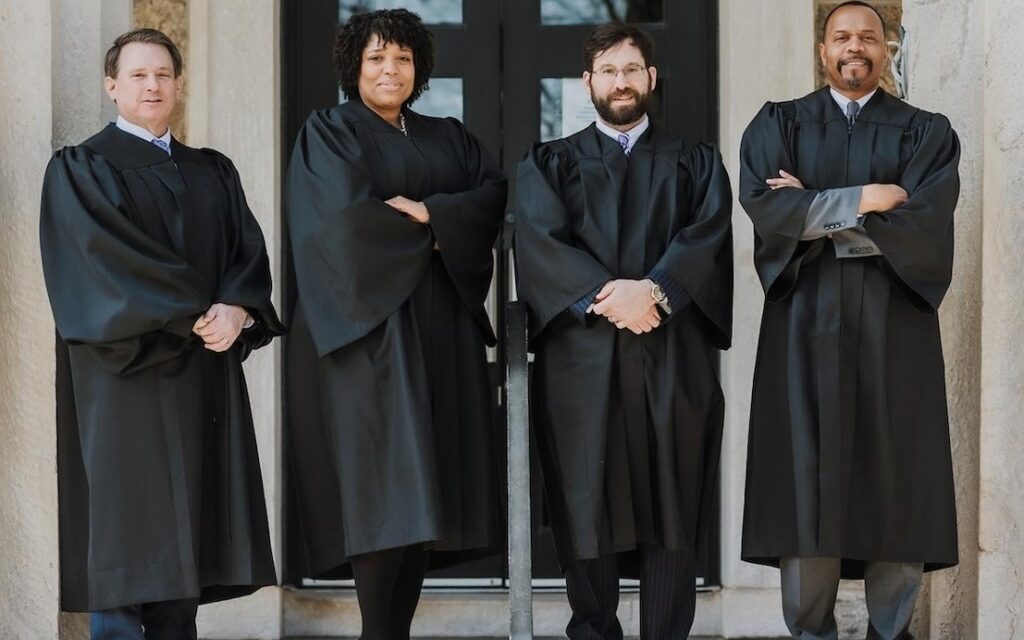By Tashi McQueen
AFRO Political Writer
tmcqueen@afro.com

Baltimore County Sitting Judges Michael Barranco, Patricia DeMaio, Marc A. DeSimone Jr. and James Rhodes came together as a slate to encourage voters to help them retain their seats on the Circuit Court for Baltimore County bench this election season.
DeMaio, DeSimone and Rhodes were appointed to the seats in December 2023. The appointments of DeMaio and Rhodes made history, as they are the first two Black judges appointed at the same time to the Circuit Court for Baltimore County.
“As demographics change around the county, you would expect to see a change in positions on county councils, the judiciary and other positions,” said Rhodes. “Taking into account also the fact that we have the first African-American governor, you would also expect that some changes will be made with respect to the increase in non-traditional people holding positions in the county.”
Rhodes practiced law for 26 years before he was appointed to the bench. He also served as the legal chair to the National Association for the Advancement of Colored People (NAACP) while providing pro bono services to law enforcement and government attorneys. Rhodes, as an attorney, tried cases in civil litigation, criminal defense, family law and more.
“I have extensive practice experience that includes both criminal law as well as civil practice as I was an in-house counsel for an insurance company,” said DeMaio. “I was a judge before I was appointed to the Circuit Court for Baltimore County. I was an administrative law judge with the Maryland Office of Administrative Hearings.”
DeMaio was also a full-time faculty member at Howard University School of Law, teaching legal reasoning, research and writing.
“My life background is such that I understand what our citizens face. On the bench I’m not sitting high and looking low on people,” said DeMaio. “I was raised by a single parent. My mother was a teen mother. We grew up in subsidized housing and on public assistance. My mother died when I was 19 after my first year of college.”
“I know what it’s like to feel like you are part of those who have been left behind. I know what it feels like to try to fight to make it out of a life circumstance that you did not choose, but you were born into,” DeMaio continued. “I think it’s that background and that experience that allows me to make decisions with compassion, with respect, with understanding and to treat people fair and justly when they appear in front of me in court.”
All appointed candidates had to go through an extensive vetting process in order to even be presented to Gov. Wes Moore as an option.
DeMaio explained that within the appointment process candidates have to include their practice experience, community service and any negative things in their history.
“It doesn’t mean you won’t become a judge, but you have to disclose everything,” she said.
DeMaio added that they also had to go through interviews with several bar associations.
All materials in the process are submitted to the Judicial Nominating Commission who then interviews you and selects a shortlist of names that is then sent to the governor. The governor then interviews the candidates and chooses who to select for a vacancy from there.
“We are Baltimore County residents ourselves, our families live here,” said Rhodes. “We want to make sure that the people who appear before us are just as safe as we want our families to be.”
Since the appointment, they have served in the Circuit Court, but this historical appointment could be short lived if voters do not select them both on May 14, during the Maryland primary and on Nov. 5 in the general election.
Judge races are typically uncontested, but this year, Robert Daniels decided to run. As the ballot is organized by last name, Daniels’ moniker places him second on the ballot, making it more likely that voters will choose him, potentially unseating one of the appointed judges.
This concerns supporters of DeMaio and Rhodes, who believe some voters– when asked to choose four judges– will simply mark the first four names on the ballot.
“I think that certainly there is luck in ballot placement, some folks do win the alphabet lottery, but I wanted to make this race about qualifications and experience from the moment I got in,” said Daniels, in response to the concerns. “I would really love nothing more than if we could put an end to ballot placement being the deciding factor.”
Only four candidates can be selected on the ballot, and Daniels makes five.
Tashi McQueen is a Report For America corps member.
The post Judges fight to retain seats in 2024 election cycle appeared first on AFRO American Newspapers.











